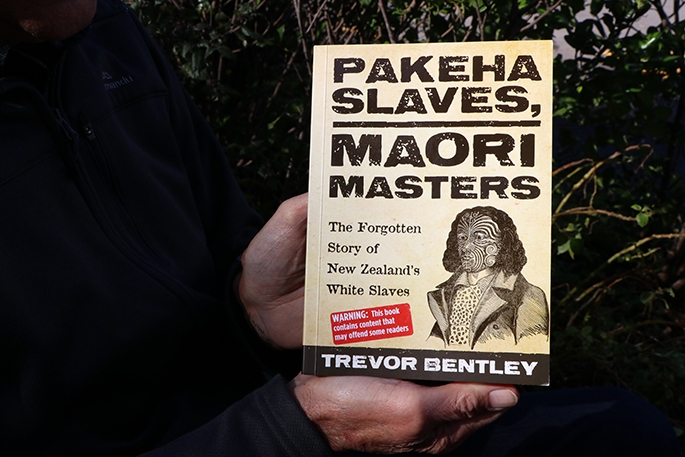Monthly Archives: June 2023
The forgotten story of NZ’s Pakeha Slaves
The forgotten story of NZ’s Pakeha Slaves
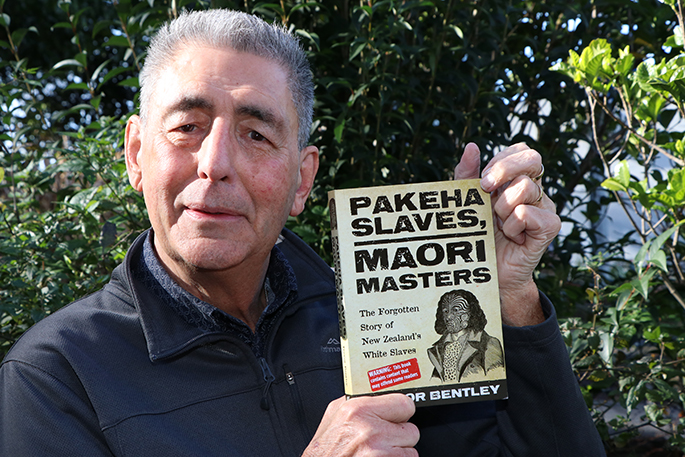
Trevor Bentley with his book that has been red-stickered. Photo: Daniel Hines
There’s a red warning sticker on the front of Trevor Bentley’s latest book.
Prepare to be offended.
Trevor Bentley, who has a PhD in history, is the first NZ historian to have a book red-stickered. His newly published work ‘Pakeha Slaves, Maori Masters: The Forgotten Story of New Zealand’s White Slaves’ has thrown a strong light on the mostly forgotten story of the Europeans who lived and sometimes died as slaves in tribal New Zealand between the 1790s and 1880s.
“I wrote it to be non-biased, pretty balanced and non-judgemental, but it was still red-stickered,” says Trevor. “I think that’s a result of the current preoccupation we have with hate speech in the wake of the Christchurch massacres.
“I’ve always been fascinated by that very colourful and turbulent pre-treaty of Waitangi interaction between Maori and Pakeha,” says Trevor, who has written three books based in that period of time – ‘Pakeha Maori’, ‘Captured by Maori’ and ‘Cannibal Jack’.”
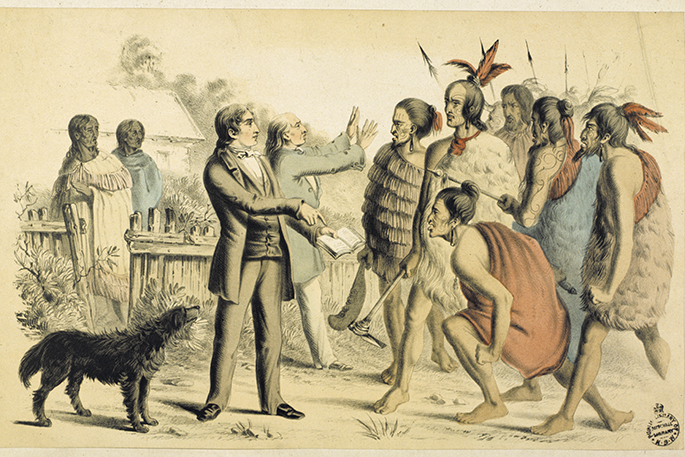
‘Missionaries Henry and William Williams and a muru-plundering party’. Vassal Pakeha who failed to comply with tikanga Maori were ritually plundered by their masters and no exceptions were made for the missionary leader Henry Williams and his brother William (shown). Image credit: Artist unknown, ‘The Power of God’s Word’, 1856, PUBL-0151-2-013, Alexander Turnbull Library, Wellington.
Trevor has had a long-standing interest in the interaction of Maori and Pakeha in pre-Treaty New Zealand and the Europeans who entered Maori tribal societies voluntarily and involuntarily. He has done significant research on New Zealand history pre-Treaty of Waitangi, and on “culture crossers”.
“Other books have focused on the positive aspects of trading and intermarriage, but this one is a bit more hard-hitting,” says Trevor.
“The main people Maori took as slaves were the mariners who were often no better than pirates. There were also hundreds of runaway sailors and escaped convicts from Sydney who were welcomed in to Maori communities. Many of them were very belligerent hard men. Maori regarded then as being uncouth and uncultured. They refused to assimilate, committed crimes and insulted the chiefs, so were enslaved and put to work.
“Community service if you like, for their misdeeds.”
“They were given a few rights, but they were still tribal property or property of the Chiefs. There were also missionaries, shore-based whalers, timbermen or sawyers, and flax traders. They were certainly welcomed in to the Maori communities, given access to resources and protection and got on very well with Maori as long as they contributed. As long as they paid trade goods or reciprocated on a regular basis, then all was fine, but if not then they were plundered.
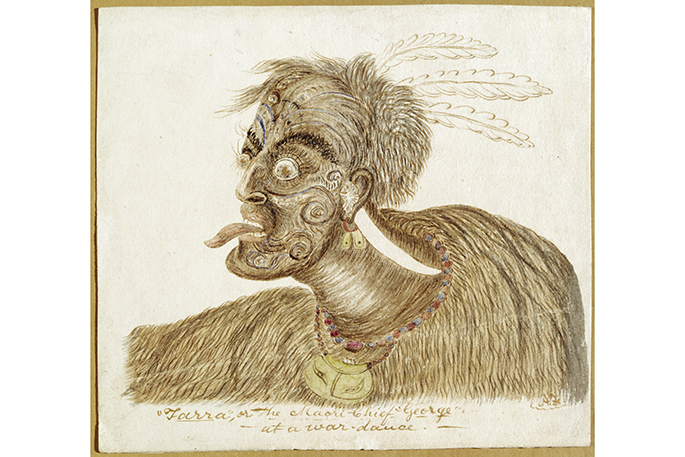
‘The Chief Te Aara of Ngati Uru, Whangaroa’. Image credit: H. Augustus Florence, ‘ “Tarra”, or the Maori Chief “George” at a war- dance’, A-114-002, Alexander Turnbull Library, Wellington.
“Probably the most famous incident was Caroline Perrett, who, at age eight was kidnapped by Maori in Taranaki in 1874, and discovered living as a Maori in Whakatane fifty years later. She was kidnapped because her father had dug up some Maori graves and because Europeans had kidnapped a local Maori child. There is a book about that kidnapped Maori child called “The Fox Boy.’ He was raised by William Fox who later became NZ premier.”
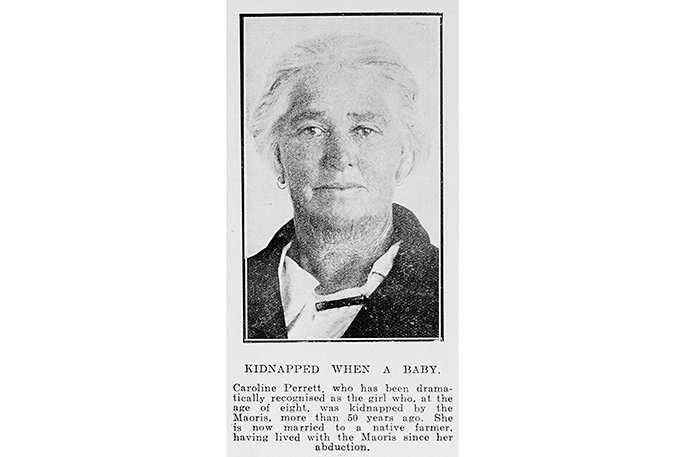
Newspaper clipping of Caroline Perrett’s discovery
Trevor’s book is fascinating, examining and exploring the diverse backgrounds and roles performed by European slaves, their sale prices and the immediate and long term physical and psychological effect of their servitude.
Trevor has extensively researched published histories by hapu and iwi historians and writings on customary law by Maori scholars, also captivity narratives by returned Pakeha slaves, and contemporary accounts about white slaves in newspapers, journals, letters and logs.
Gets me every time
Yeah, The Science
treaty of waitangi Original Version. So Easy to read
English text
English version of treaty
Waikato-Manukau Treaty copy (English)
HER MAJESTY VICTORIA Queen of the United Kingdom of Great Britain and Ireland regarding with Her Royal Favor the Native Chiefs and Tribes of New Zealand
and anxious to protect their just Rights and Property and to secure to them the enjoyment of Peace and Good Order has deemed it necessary in consequence
of the great number of Her Majesty’s Subjects who have already settled in New Zealand and the rapid extension of Emigration both from Europe and Australia
which is still in progress to constitute and appoint a functionary properly authorized to treat with the Aborigines of New Zealand for the recognition of
Her Majesty’s Sovereign authority over the whole or any part of those islands – Her Majesty therefore being desirous to establish a settled form of Civil
Government with a view to avert the evil consequences which must result from the absence of the necessary Laws and Institutions alike to the native
population and to Her subjects has been graciously pleased to empower and to authorize me William Hobson a Captain in Her Majesty’s Royal Navy Consul and
Lieutenant-Governor of such parts of New Zealand as may be or hereafter shall be ceded to her Majesty to invite the confederated and independent
Chiefs of New Zealand to concur in the following Articles and Conditions.
Article the first [Article 1]
The Chiefs of the Confederation of the United Tribes of New Zealand and the separate and independent Chiefs who have not become members of the Confederation
cede to Her Majesty the Queen of England absolutely and without reservation all the rights and powers of Sovereignty which the said Confederation or
Individual Chiefs respectively exercise or possess, or may be supposed to exercise or to possess over their respective Territories as the sole sovereigns thereof.
Article the second [Article 2]
Her Majesty the Queen of England confirms and guarantees to the Chiefs and Tribes of New Zealand and to the respective families and individuals thereof the
full exclusive and undisturbed possession of their Lands and Estates Forests Fisheries and other properties which they may collectively or individually
possess so long as it is their wish and desire to retain the same in their possession; but the Chiefs of the United Tribes and the individual Chiefs yield
to Her Majesty the exclusive right of Preemption over such lands as the proprietors thereof may be disposed to alienate at such prices as may be agreed
upon between the respective Proprietors and persons appointed by Her Majesty to treat with them in that behalf.
Article the third [Article 3]
In consideration thereof Her Majesty the Queen of England extends to the Natives of New Zealand Her royal protection and imparts to them all the
Rights and Privileges of British Subjects.
(signed) William Hobson, Lieutenant-Governor.
Now therefore We the Chiefs of the Confederation of the United Tribes of New Zealand being assembled in Congress at Victoria in Waitangi and
We the Separate and Independent Chiefs of New Zealand claiming authority over the Tribes and Territories which are specified after our respective names,
having been made fully to understand the Provisions of the foregoing Treaty, accept and enter into the same in the full spirit and meaning thereof in
witness of which we have attached our signatures or marks at the places and the dates respectively specified. Done at Waitangi this Sixth day of
February in the year of Our Lord one thousand eight hundred and forty.


